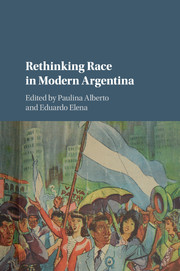Book contents
- Frontmatter
- Contents
- List of figures
- List of tables
- Notes on the contributors
- Preface
- Introduction: The shades of the nation
- PART I HISTORIES OF RACE IN THE TWENTIETH CENTURY
- PART II RACE AND NATION IN THE NEW CENTURY
- 8 African descent and whiteness in Buenos Aires: Impossible mestizajes in the white capital city
- 9 The savage outside of White Argentina
- 10 Between foreigners and heroes: Asian-Argentines in a multicultural nation
- 11 Indias blancas, negros febriles: Racial stories and history-making in contemporary Argentine fiction
- Epilogue: Whiteness and its discontents
- Collective bibliography
- Index
10 - Between foreigners and heroes: Asian-Argentines in a multicultural nation
from PART II - RACE AND NATION IN THE NEW CENTURY
Published online by Cambridge University Press: 05 March 2016
- Frontmatter
- Contents
- List of figures
- List of tables
- Notes on the contributors
- Preface
- Introduction: The shades of the nation
- PART I HISTORIES OF RACE IN THE TWENTIETH CENTURY
- PART II RACE AND NATION IN THE NEW CENTURY
- 8 African descent and whiteness in Buenos Aires: Impossible mestizajes in the white capital city
- 9 The savage outside of White Argentina
- 10 Between foreigners and heroes: Asian-Argentines in a multicultural nation
- 11 Indias blancas, negros febriles: Racial stories and history-making in contemporary Argentine fiction
- Epilogue: Whiteness and its discontents
- Collective bibliography
- Index
Summary
Argentina's economic crisis of 2001 triggered a crisis in national identity that cast doubt on the nation's long-held beliefs about its racial and cultural exceptionalism as a white and therefore modern nation. In the decade after the crisis, Argentina experienced a major shift in racial discourse, redefining itself as a multiracial and multicultural nation. The newly adopted multiculturalism does not entirely displace older understandings of race and nation – as Gastón Gordillo demonstrates in Chapter 9 of this volume, the increased visibility of nonwhites has heightened racial violence in contemporary Argentina – but it does mark a radical departure from previous official discourses that insisted on the nation's homogeneous whiteness. Argentina's rather abrupt multicultural turn has to do in part with the expediency of multiculturalism, which helps articulate both populist and elite reconfigurations of the national narrative. In one sense, the multicultural discourse that focuses largely on Afro-descendants and indigenous peoples disavows previous claims of Europeanness to adopt a populist Latin-Americanist position as an antidote to the globalization of neoliberal capitalism. It is within this context that a contestatory working-class coalition using the racial marker “negro” also arose. Simultaneously, however, multiculturalism is often seen as a sign of neoliberal globalization – as the transnational flow of capital triggers migrations and diversifies cultural consumption – and as a marker of first world status in a global climate in which the notion of development encompasses the “preservation – or even cultivation – of ethnoracial diversity.” In this context, a vast network of institutional, academic, political, and cultural discourses along with popular ethnic activism dismantled notions of white homogeneity to establish Argentina as multicultural. Afro-Argentine and indigenous peoples – who had been considered “disappeared” – claimed their legitimate space within the nation; Argentines of European descent who had melted into the crisol de razas [melting pot] began to assert their ethnicities; and diversity became a key measure of social justice.
This proliferation of ethnicities has more recently extended to Asians in Argentina, as evidenced by their changing position in cultural discourses. In the context of Argentina's incipient multiculturalism, cultural manifestations featuring Asians as protagonists, rather than as exotic or awkward peripheral characters, have gained popularity.
- Type
- Chapter
- Information
- Rethinking Race in Modern Argentina , pp. 268 - 288Publisher: Cambridge University PressPrint publication year: 2016
- 4
- Cited by



